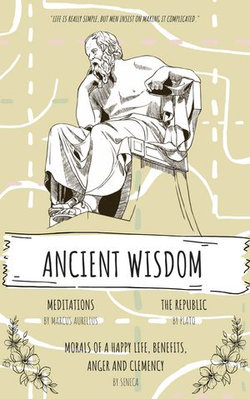This Trilogy of Ancient Wisdom brings together some of the greatest minds of ancient Time.
The Republic
The Republic is a Socratic dialogue, authored by Plato around 375 BC, concerning justice, the order and character of the just city-state, and the just man. It is Plato's best-known work, and has proven to be one of the world's most influential works of philosophy and political theory, both intellectually and historically.In the dialogue, Socrates talks with various Athenians and foreigners about the meaning of justice and whether the just man is happier than the unjust man. They consider the natures of existing regimes and then propose a series of different, hypothetical cities in comparison, culminating in Kallipolis, a utopian city-state ruled by a philosopher king. They also discuss the theory of forms, the immortality of the soul, and the role of the philosopher and of poetry in society. The dialogue's setting seems to be during the Peloponnesian War.
Meditations
Meditations is a series of personal writings by Marcus Aurelius, Roman Emperor from 161 to 180 AD, recording his private notes to himself and ideas on Stoic philosophy.Marcus Aurelius wrote the 12 books of the Meditations in Koine Greek as a source for his own guidance and self-improvement. It is possible that large portions of the work were written at Sirmium, where he spent much time planning military campaigns from 170 to 180. Some of it was written while he was positioned at Aquincum on campaign in Pannonia, because internal notes tell us that the first book was written when he was campaigning against the Quadi on the river Granova (modern-day Hron) and the second book was written at Carnuntum.It is unlikely that Marcus Aurelius ever intended the writings to be published and the work has no official title, so "Meditations" is one of several titles commonly assigned to the collection. These writings take the form of quotations varying in length from one sentence to long paragraphs.”
Seneca's Morals of a Happy Life, Benefits, Anger and Clemency
Seneca the Younger (c. 4 BC – AD 65), fully Lucius Annaeus Seneca and also known simply as Seneca,was a Roman Stoic philosopher, statesman, dramatist, and—in one work—satirist of the Silver Age of Latin literature.As a writer Seneca is known for his philosophical works, and forhis plays, which are alltragedies. His prose works include a dozen essays andone hundred twenty-four lettersdealing with moral issues. These writings constitute one of the most importantbodies of primary material for ancientStoicism. As a tragedian, he is best known for plays such as his Medea, Thyestes, and Phaedra. Seneca's influence on later generations is immense—during the Renaissance he was "a sage admired andvenerated as an oracle of moral, even of Christian edification; a master of literary style and a model for dramatic art.



Share This eBook: